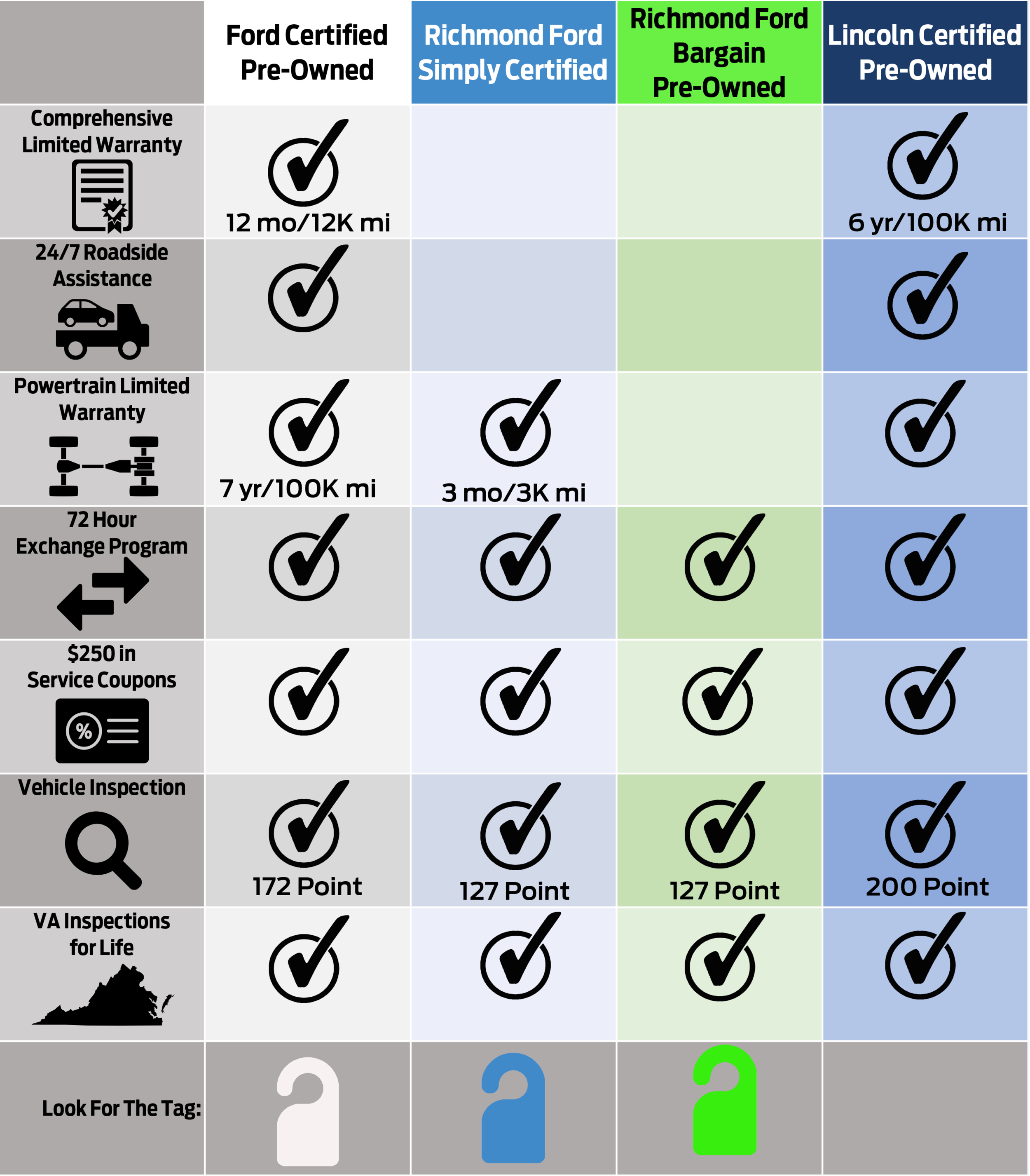When you're shopping for a new-to-you car, finding a great used car can be a smart decision. However, it's a decision you need to make carefully. To help you out, Richmond Ford Lincoln has crafted an insightful guide!
In our guide to buying used cars, we'll cover the following themes:
- Budgeting: Developing your budget.
- Valuing your trade: Getting a realistic number (valuing it online isn't enough).
- Locating used cars: Finding used cars that fit your lifestyle.
- Understanding different used and certified pre-owned options: The different used car certification levels and what they mean.
- Look over the used car: Inspecting the prospective vehicle.
- Test drive: What to look out for on the test drive.
- Financing: Identifying the best value by speaking with financial experts.
Develop Your Budget
One of the most important factors to consider when purchasing a used car is your budget. You want a quality pre-owned vehicle that aligns with this value you set ahead of time.
When getting an idea of what your budget will be, you should calculate what a reasonable monthly payment is. If you have a vehicle you'd like to trade in, make sure you get a REAL value on it (we'll explain in more detail below).
Once you've figured out your budget, the next steps will be easier to take.
- Browse a few used cars to get a sense of the model type you're looking at.
- Factor in your incidentals like rent/mortgage, utilities, and essentials, then see what's left over you wouldn't mind putting toward a car each month.
- If you are looking to trade in your existing vehicle, you can utilize tools like Kelley Blue Book or our trade-in calculator to get a rough estimate of what your car is worth. However, if you want a concrete number on how much you'll get for your vehicle, it is best to bring it into the dealership. At Richmond Ford Lincoln, we'll examine your car with you and utilize our online pricing tools to let you know what it's worth.
Locating the Right Used Car
Luckily, the internet is a valuable tool you can use to help find a great pre-owned car in your area. We advocate buying from a reputable used car dealership, not a private seller. Starting your search is as easy as typing used car dealers near me into Google.
- Browse the used car inventory of your local reputable dealerships.
- Utilize the search filters available to cut down on your browsing time.
- After you've created a list of models that seem like good options, research those models by utilizing vehicle review pages. This will allow you to see differences in trim levels and model years.
What Do These Used Car Certification Levels Mean?
When you start your search, you'll notice that many vehicles have different "certification levels." These indicate what warranties, history, and special offers will be available on that used vehicle.
Often, you'll see used cars labeled as "certified pre-owned" or other designations. Sometimes these differ, depending on which dealership you are looking at. As a helpful guide, here is what each designation means at our dealership…

Ford Certified Pre-Owned
- Comprehensive limited warranty: 12 months or 12,000 miles
- Limited powertrain warranty: 7 years or 100,000 miles
- 24/7 roadside assistance
- 72-hour exchange policy
- $250 in service coupons
- 172-point vehicle inspection
- VA state inspections for life
Richmond Ford Simply Certified
- Limited powertrain warranty: 3 months or 3,000 miles
- 72-hour exchange policy
- Complimentary first oil change and $500 in service coupons
- 127-point vehicle inspection
- VA state inspections for life
Richmond Ford Basic Pre-Owned (this certification level covers ALL of our used inventory)
- 72-hour exchange policy
- Complimentary first oil change and $500 in service coupons
- 127-point vehicle inspection
- VA state inspections for life
Next Steps After Finding the Right Used Car
When you think you have found a vehicle or vehicles online that you'd like to try, you have two options:
- Drop by the dealership: This is always an option at any dealership, and you'll always be welcomed.
- Schedule an appointment: You can do this by giving the dealership a call or by submitting a lead online. A friendly business development representative will reach out to help you schedule your appointment.
Things to Let the Dealership Know
You should develop a game plan for your visit at the dealership. Understanding which questions to ask and which information to seek is a big part of successfully landing your preferred used car.
Here's a quick rundown of topics to consider:
- What you are looking for: Sometimes, vehicles that are in transit (on the way to the dealership) may be unlisted online but available for you to try.
- Let the dealership know all the vehicles you're considering: This will allow your product specialist to have those vehicles gassed up and gather any necessary info about them.
- How much time you'll have: That way, they can let the product specialist know if they need to hurry things along on your test drive.
- If you'll be bringing a trade-in: This is a great time to get your trade-in appraised and find out what that particular dealership is willing to pay for it.
Inspect the Vehicle Thoroughly
When you arrive at your local used car dealership and are looking at prospective automobiles, it's always a smart idea to inspect the vehicle to make sure it's up to your standards. By giving the car a closer look, you'll be able to spot any warning signs.
Here are some areas our experts say you should look…
- Exterior/interior: Inspect for any signs of wear like dents, scratches, or tears in the upholstery.
- Smells: Be aware of any strange odors coming from the vehicle. You want to do this before and during your drive. If it's an interior smell like smoke, dealerships can often help eliminate this. If it's another smell like anything burning, make sure to raise a concern. It could be a simple fix like an oil change or something larger.
- History: Ask how much of the vehicle's history is available. While this may vary based on certification level, many used cars come with history reports.
- Mileage: Make sure the vehicle is at the right mileage for you and that it matches or is close to what was stated online (test drives can sometime add minimal mileage but beware of large discrepancies).
A vehicle history report is another major sticking point that you should ask about. The report will give you a rundown of the model's past, including any accidents, previous owners, all the services it has received, and more.
Take the Test Drive
The deciding factor for your next car is the test drive. This is your chance to get behind the wheel. By taking the test drive, you'll be able to tell if it's the right vehicle for you.
Here are some aspects to keep an eye on…
- Steering feel: Get a feel for how the vehicle handles on turns. Is the steering wheel responsive?
- Responsiveness: Test out the accelerator and brake pedals. Are they too touchy, barely there, or do they perform as expected?
- Reliability: Listen for any unusual engine sounds. A peculiar engine sound could indicate a mechanical issue.
- Technology: Play with any technology features and see if they are useful to you.
- Safety or driver-assistance features: Inquire about safety features, as safety comes first!
Identifying & Securing Strong Value
You can improve the overall value of any used model by speaking with financial experts who understand which solutions work best for you. What you may not realize is that your current vehicle holds quite a bit of value. To determine that value, schedule an appraisal.
The appraisal will consist of a well-trained expert looking over the current state of your vehicle and determining a trade-in value for it. The make, model, year, condition, and reliability of your current vehicle will all be considered.
In the end, the value of your current vehicle will go a long way toward improving the value of the pre-owned model you have your eyes on!
Buy a Used Car in Richmond
In our used car guide, you learned all about the different steps you should take when actively searching for a used car. By following these steps, you'll be able to make the best decision possible.
Would you like more information on our used car inventory? Stop in and see us at Richmond Ford Lincoln, the used car dealership that proudly serves drivers in the Richmond, Ashland, and Mechanicsville areas.


